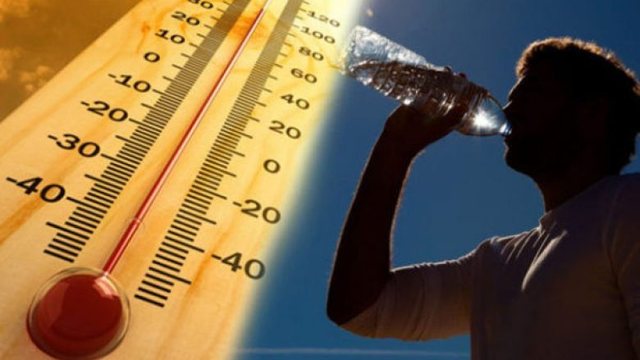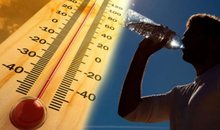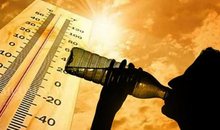
Heart health is at risk from extreme heat, here's what you should be careful of

The weather fluctuations seem to have ended, giving way to scorching temperatures. These temperatures are more unbearable, especially for children and the elderly.
But extreme heat is extremely dangerous, especially for people suffering from cardiovascular diseases.
How does heat affect the body?
Body temperature should be neither too hot nor too cold. According to data, if the temperature rises significantly, the proteins that protect the body and are responsible for every process in it stop functioning.
The human body copes with high heat in two ways that stress the heart.
Radiation
Heat in the body moves from warmer areas to cooler ones. As long as the surrounding air is cooler than the body, the body radiates heat into the air.
This radiation stops when the air temperature approaches that of the body. Radiation is a process that requires a more centralized blood circulation, especially in the skin area.
This makes the heart beat faster and pump more blood.
On a hot day, the heart circulates two to four times more blood per minute than on a cool day.
evaporation
Every sweat molecule that evaporates from the skin carries excess heat with it. On a day without humidity, the evaporation of sweat (an amount equivalent to a teaspoon) significantly cools the entire blood.
But when humidity rises above 75%, sweat evaporation becomes extremely difficult.
Sweat evaporation increases pressure on the cardiovascular system.
According to data, sweat removes more heat from the body, along with many minerals beneficial to nerves, muscles, and fluid balance.
This forces the body to release more hormones which help the body retain more water and minimize mineral loss.
Heart health and coping with the heat
Healthy people tend to have a higher tolerance to temperature changes. People with heart problems have a more stressed body and are therefore more affected by the heat.
The heart of people who have had a heart attack has a harder time pumping enough blood to cope with the heat.
Clogged blood vessels due to cholesterol have poor blood circulation to the skin. Ischemia, Parkinson's, Alzheimer's, Diabetes and others negatively affect the brain's response to dehydration.
Thus, the brain fails to send thirst signals and the body suffers the consequences.
How to fight the heat
Experts recommend that people who exercise do so early in the morning or late in the evening. During peak heat, make sure to stay in an air-conditioned environment, take a bath, or apply cold compresses to your armpits.
It is advisable to make sure to drink water every hour on hot days. Do not drink carbonated, sugary, alcoholic or caffeinated drinks which worsen dehydration./AgroWeb.org
Latest news


What is the ideal air conditioner temperature in summer?
2025-07-07 20:53:46
GJKKO left him in prison, Meta appeals the decision
2025-07-07 20:38:05
Where is Ronaldo after missing Diogo Jota's funeral?
2025-07-07 20:38:04

Messages from the author who killed Ilaria Sulla in Rome are revealed
2025-07-07 20:20:12
At least 91 dead in Texas floods
2025-07-07 20:12:02
Elbasan, choked by smoke, scorched by conscience
2025-07-07 19:48:16

Swarm of bees attacks citizens in France, 24 people end up in hospital
2025-07-07 19:32:03
Dementia/Hearing loss may be a warning sign
2025-07-07 19:13:06
The decision for Malltez, Gjokutaj: Boomerang for SPAK and the Court
2025-07-07 19:01:08

Former Supreme Court member acquitted of asset concealment
2025-07-07 18:36:40

WIIW expert in Politiko: Brain drain is steadily weakening the Albanian economy
2025-07-07 18:11:41
Heart health is at risk from extreme heat, here's what you should be careful of
2025-07-07 18:10:18
Today Gert Bogdani would celebrate, Edlira Çepani's touching dedication
2025-07-07 17:40:45






The striker severely accuses the Fenerbahce club: They tried to drug me
2025-07-07 16:21:03
A decomposed body is found in Kolonjë, initial suspicions
2025-07-07 16:03:31
Accident in Saranda, car hits motorcycle, one injured
2025-07-07 15:58:56

The most fertile age for men and women
2025-07-07 15:40:52
Locals, Rama candidate in 5 municipalities
2025-07-07 15:32:22
Blushi: Meta's criminal kidnapping, incomparable even to Navalny's in Russia
2025-07-07 15:20:34
Meet the iPhone 17 Pro, the main innovations in design and technology
2025-07-07 15:09:09
Why the release of Abi Malltez does not free him; much less Albania
2025-07-07 15:00:12
‘Lidhjet klienteliste’ të mjekëve mbushin recetat e pacientëve
2025-07-07 14:57:33
Poland imposes border controls with Germany and Lithuania
2025-07-07 14:48:15

Caught transporting firearms from Kosovo to Albania, young man arrested (NAME)
2025-07-07 14:37:47
Theo Hernandez flies to Saudi Arabia for medical check-ups
2025-07-07 14:26:47


Scorching heat, Greece orders mandatory work holidays
2025-07-07 13:54:25




Trump expects Netanyahu to discuss Gaza ceasefire
2025-07-07 12:54:27

GJKKO releases Jamarbër Malltezi from house arrest
2025-07-07 12:35:02
Tourism among contrasts
2025-07-07 12:31:01
IKMT action in Theth, starts demolition of unauthorized constructions
2025-07-07 12:24:18

The Tirana-Kamëz line is destroyed by urban fire
2025-07-07 12:00:24




Poor direction!
2025-07-07 11:16:01


Rama to gather the country's mayors on July 9
2025-07-07 10:43:31

Ohrid Natural Park on the way to UNESCO's "black list"
2025-07-07 10:25:58

Registrations for the new school year begin in e-Albania
2025-07-07 09:59:09
KAS decides the "fate" of the elections in four districts of the country today
2025-07-07 09:50:51
Rama does not give up on Vlora, visits the municipality again
2025-07-07 09:39:11


Fires in Gjirokastra, flames very close to cultural monuments
2025-07-07 09:12:49

Foreign exchange, the rate at which foreign currencies are sold and bought
2025-07-07 08:39:57

Horoscope, what do the stars have in store for you today?
2025-07-07 08:14:17
The week starts with scorching temperatures, the thermometer reaches 37°C
2025-07-07 07:58:36
Morning Post/ In 2 lines: What mattered yesterday in Albania
2025-07-07 07:45:15



Theologian: Behind Rama's idea for a Bektashi state in Albania, Israel is hiding
2025-07-06 20:57:48
Rama's rhetoric without standards, comparing Paris, London, New York with Vlora
2025-07-06 20:35:52
Vehicle goes off the road, driver dies in Kukës
2025-07-06 20:07:47
What is the possible agreement on the Gaza hostages and the ceasefire?
2025-07-06 19:47:09


Massive hiring in the Macedonian administration ahead of the elections
2025-07-06 18:37:19

Texas tragedy: 59 dead and 27 girls still missing after devastating floods
2025-07-06 17:48:24
Albania for sale and purchase by Jared Kushner
2025-07-06 17:17:37
Kurti reacts to bomb threat in Parliament: Active hybrid war from Serbia
2025-07-06 16:55:59

After clashing with Trump, Musk says he's forming a new political party
2025-07-06 16:14:27
Turkey increases political influence in the Western Balkans
2025-07-06 15:48:14
Dalai Lama turns 90 amid global adoration
2025-07-06 15:27:46
Tax for singles or those who do not leave
2025-07-06 15:04:00
Earth farther from the Sun, but scorching heat! Why is this happening?
2025-07-06 14:51:26
Fire at the Incinerator/ Gjokutaj Ironizes: PS should name the city Qelbasan!
2025-07-06 14:35:10
The youth exodus and Rama's political carnivals!
2025-07-06 14:16:04
VIDEO/ Gang fight in Greece revealed, 12 arrested, including Albanians
2025-07-06 13:47:52

